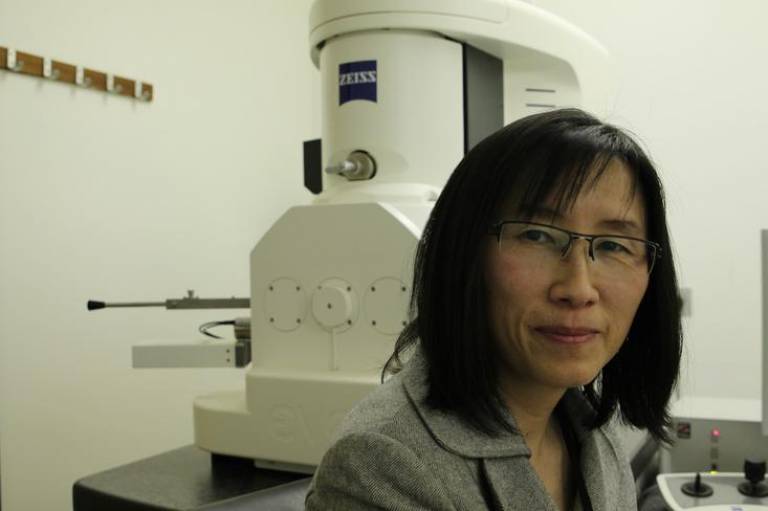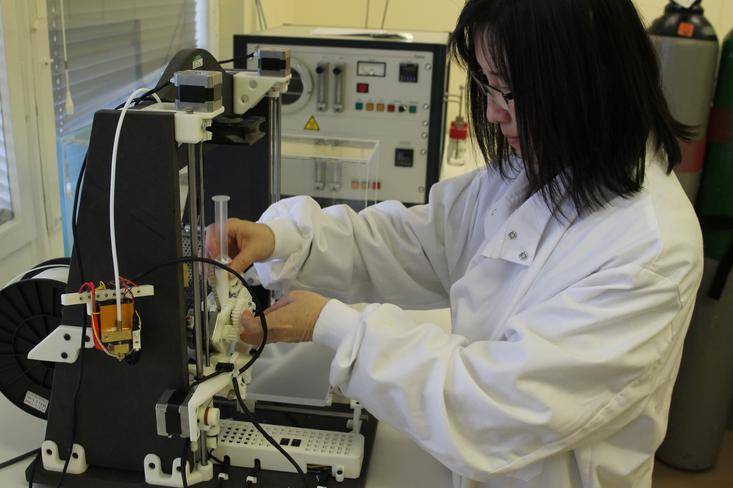Staff Spotlight - Dr Wenhui Song
9 April 2014
This month, the spotlight is on Dr Wenhui Song, Senior Lecturer in Biomaterials.

What is your role and what does it involve?
In August 2013, I joined the UCL Centre for Nanotechnology and Regenerative Medicine at the Royal Free Hospital. My research involves me working closely with industry on the development of real-world biomedical and engineering applications of nanomaterials and nanotechnology. As a result of these collaborations with industry, I have contributed to the development of devices such as the first ever implantable carbon nanotube fibre biosensor.
I am currently the module lead for ‘Biomaterials in Tissue Regeneration’, which is a cross module for the MSc in Nanotechnology & Regenerative Medicine, the MSc in Burns, Plastic and Reconstructive Surgery and the MSc in Surgical Science. I also co-supervise one PhD student with Professor Alex Seifalian. I would welcome any ambitious students to get in touch with me if they are interested in doing their PhD degree in the development of new biomaterials or nanomaterials and their translational applications in artificial organs and devices.
What has your career path been?
I did my BSc and MSc at Beihang University (previously Beijing University of Aeronautics and Astronautics), both in Engineering, specialising in polymers and advanced composites - I was supposed to be an Aerospace Engineer! After my university studies, I obtained a research assistant post at the State Key Laboratory of Polymer Physics and Chemistry, Institute of Chemistry, Chinese Academy of Sciences.
In 1997, I won a PhD scholarship to study at the University of Cambridge, where I stayed for 7 years, first as a PhD student and later as a post-doctoral fellow on a project funded by the Cambridge-MIT Institute. After Cambridge, I moved to London and worked at Brunel University for the past 10 years as a lecturer and senior lecturer.
How did your academic career fit in with your personal life?
I arrived in Cambridge alone, leaving my husband behind in China. Fortunately though, he obtained a research associate position in Cambridge during my third year! My first girl was born while I was writing my thesis and I actually undertook my PhD viva while she was just two months old. During the subsequent year, I stayed at home, looked after my daughter, and I can honestly say this was the most enjoyable and relaxing period of my life – no science at all!
My second girl was born whilst I was a lecturer at Brunel, which was tough. I had teaching commitments and a PhD student who was close to submitting her thesis and so I only took four months maternity leave. I was lucky that my parents were able to help me for a short period of time with childcare responsibilities but in the end, I had to send my daughters to nursery earlier then I would have liked.
Back then, I did feel guilty about not spending more time with my girls - that was the sacrifice I made to be an academic. However now, I am glad to see that my daughters are thriving. They know that they have got a “very busy” mum and they understand. If anything, this has made them more independent and I am incredibly proud!
What advice would you give to PhD students?
You must be incredibly self-motivating. Not only should you enjoy researching science but you should be excited by the prospect of discovering something new or seeing something differently. Work hard but do take the time to be proud of your achievements.
What working achievement or initiative are you most proud of?
Probably winning the PhD scholarship to study at the University of Cambridge and discovering the liquid crystalline phase of carbon nanotubes. Not only did this give me the opportunity to work under Professor Alan Windle (FRS), the world-leading polymer physicist in the Department of Materials Science and Metallurgy but this was also my first time abroad. The thought of studying and working at Cambridge and publishing my research in Science had always been something I had dreamed of but I never imagined I would realise it! I will never forget the exciting moment when I observed the beautiful liquid crystal structure of the black carbon nanomaterials under a microscope. It was something that we had spent years searching for. My parents were incredibly proud of me, watching me graduate in the historic Senate House, the Old Schools.

How do you keep motivated?
I like doing new things and being confronted by new challenges. Coming to the UK for the first time, experiencing a new culture and conducting my research within a different academic environment, was incredibly challenging but also an incredibly motivating period within my career. I was forced to confront and conform to new areas and methods of practice – needless to say the UK Higher Education system is entirely different to China’s. Despite the initial shock, I soon realised how positive and beneficial this would be for my career.
In terms of my current motivation, my two daughters keep me very busy and provide a welcome respite from my day job, even if they do force me to watch the X Factor with them!
I attend a number of international meetings and conferences and even though I travel mainly for work purposes, I always take some time, if only a couple of hours, to try and discover a city. Actually, I am going to India in February for the 2nd International Conference on Advanced Functional Materials in Kerala and then immediately afterwards, my family are going to join me for a week’s vacation!
Do you have a good work/life balance?
I am fortunate because my husband is a software engineer and so he is able to work from home whenever there is a need. He takes on a lot of the childcare responsibilities and housework. This is essential, especially when I have to travel abroad.
I take advantage of flexible working when I can – I often work late into the evenings but I’ll come into the office a little later so I can take my daughters to school.
What would it surprise people to know about you?
I used to practise folk dancing back in China but that was a long time ago. My “dancing” is now strictly confined to the kitchen.
Who would be your dream dinner guest?
Marie Curie. She was one of the reasons I became passionate about science from an early age. Growing up in Yunnan, one of the remotest provinces in China, there was no television. Our only access to the outside world were newspapers and the radio. When I was a little girl, I recall listening to the life story of Marie Curie on the radio (in Chinese of course!) and I remember what an inspirational moment this was for me. As a side-note, I am actually a really good cook!
What would you be if you were not a scientist?
Probably a doctor. My mother really pushed for me to study medicine but I chose materials science instead - part of my teenager rebellion I guess! As my research evolved, I became more and more involved in applied sciences, particularly bioengineering. I’ve really enjoyed adding a clinical dimension to my research, such as the manufacturing of artificial organs and development of biosensors and devices. Perhaps by developing this aspect of my research, I can somewhat fulfil my mother’s ambition!
What will be the most exciting innovation in biomaterials in the next 50 years?
I think in 50 years it would be feasible to suggest that we will have printed a human kidney. We can certainly create artificial human tissue by mimicking the structures of human organs but there is still a massive gap between creating organs which resemble the same biological processes of the real ones.
 Close
Close

